Chart Joseph's extraordinary biblical journey, from dreamer to ruler, and uncover a tale of faith, perseverance, and redemption waiting to be explored.
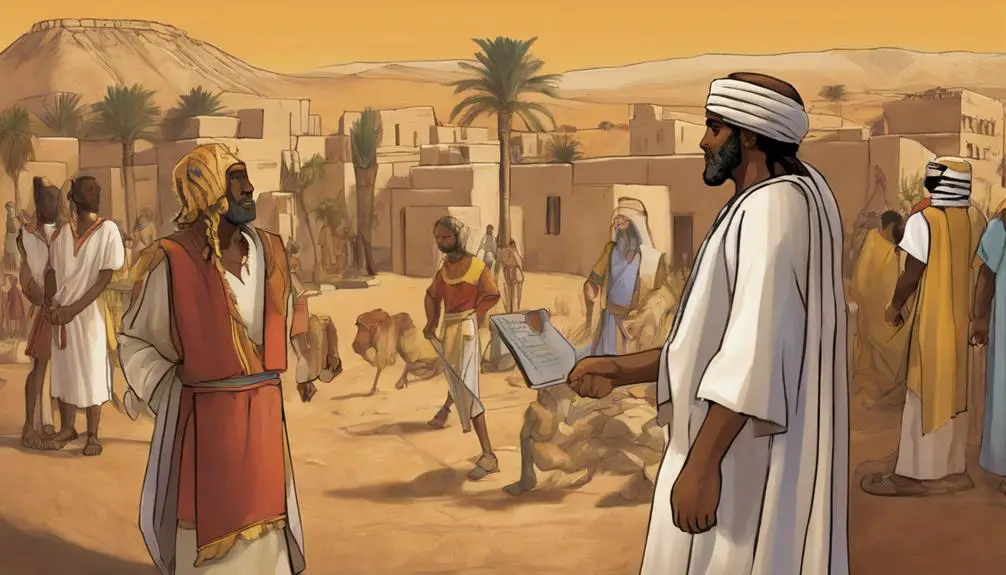
Timeline of Joseph in the Bible
Imagine, if you will, time-traveling back to the ancient world, your smartphone in hand, loaded with the timeline of Joseph's life from the Bible.
Here we are, ready to explore pivotal moments from his early dreams to his rise to power in Egypt. But how does a dreamer become a ruler? This dramatic transformation is filled with trials and triumphs, each moment offering a fresh perspective on faith, perseverance, and redemption.
Let's unpack this journey, shall we? Yet, remember, we're only scratching the surface. There's so much more to discover.
Key Takeaways
- Joseph's early life was characterized by prophetic dreams and intense family conflicts, with his father's favoritism intensifying sibling rivalry.
- Sold into slavery by his brothers, Joseph's journey to Egypt marked a significant transformation from a favored son to a slave.
- During his unjust imprisonment, Joseph's unwavering faith led him to discover his gift of dream interpretation, providing comfort and insight to fellow inmates.
- Joseph's rise to power in Egypt, from a prisoner to Pharaoh's right-hand man, was marked by his successful seven-year famine plan and integration into Egyptian society.
Joseph's Early Life and Dreams

Diving into the narrative of Joseph's early life, one finds a tale rife with prophetic dreams and familial tension, setting the foundation for his pivotal role in biblical history. Notably, dream symbolism plays a critical role in Joseph's early life. His dreams, often featuring agricultural symbols, weren't merely figments of his subconscious but prophetic visions that earned him the reputation of a dream interpreter.
Joseph's dreams, however, weren't received well by his family. His brothers interpreted his dreams as declarations of superiority, leading to familial tension. This tension was exacerbated by the apparent parental favoritism. Joseph, being the favorite of his father Jacob, was gifted a coat of many colors. This act of favoritism, coupled with Joseph's dreams, stoked the fires of sibling rivalry and resentment.
Sold Into Slavery
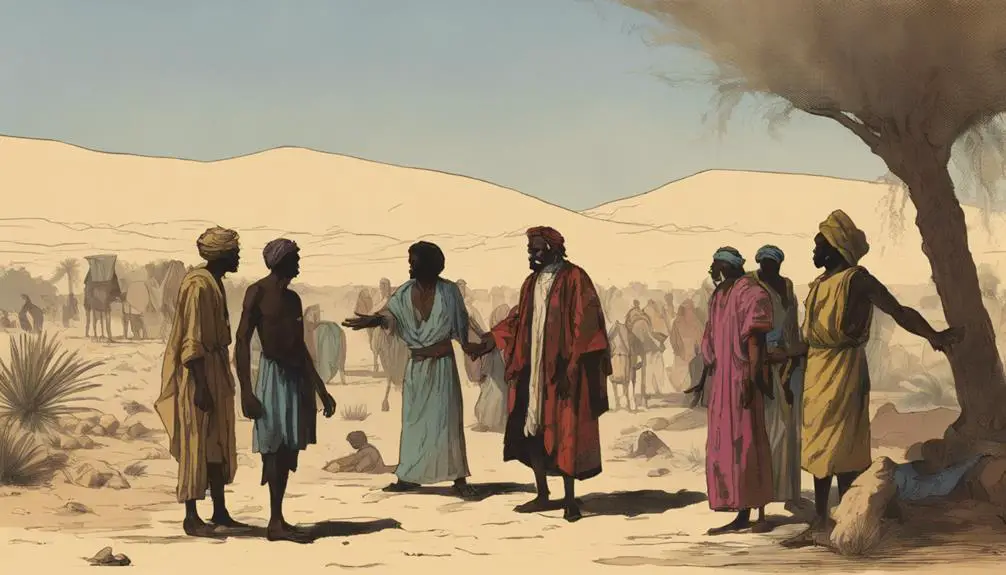
In the midst of this intense family rivalry, Joseph's brothers, consumed by their resentment, made the fateful decision to sell him into slavery, marking a pivotal turning point in Joseph's life and biblical narrative. This act of brotherly betrayal, fueled by jealousy and anger, had profound slavery impacts on Joseph's future.
The below table offers a succinct overview of the key events:
Event |
Impact |
|---|---|
Brotherly Betrayal |
Set the stage for Joseph's enslavement |
Sold into Slavery |
Transformed Joseph from a favored son to a slave |
Journey to Egypt |
Signified a shift in Joseph's life and destiny |
Life in Potipar's House |
Reserved for next subtopic |
Rise to Power |
Reserved for future subtopic |
The selling of Joseph not only stripped him of his familial ties and personal freedom, but it also uprooted him from his homeland, forcing him into a life of servitude in Egypt. This drastic change in circumstances significantly molded Joseph's character, tested his faith, and set the stage for his future rise to power in Egypt. Despite the harsh reality of his situation, Joseph's story is one of resilience, faithfulness, and divine providence.
Joseph's Time in Potipar's House

Upon arriving in Egypt, Joseph's life took a dramatic turn as he found himself in the house of Potipar, a high-ranking Egyptian official, where he experienced both favor and false accusations. Potipar recognized Joseph's unique abilities and elevated him to oversee his household. This promotion, however, attracted the unwelcome attention of Potipar's wife.
Caught in a narrative laced with power dynamics and deceit, you see Joseph navigating the treacherous waters of Potipar's household. Potipar's wife, a pivotal character, perpetuated the plot by falsely accusing Joseph of attempted seduction. This accusation, however, isn't merely a scandalous twist; it illustrates a profound exploration of Biblical ethics.
In this context, Biblical ethics become a lens through which you can examine Joseph's steadfast adherence to righteousness, despite the precarious situation. His refusal to succumb to Potipar's wife's advances, despite the potential benefits, underscores a commitment to virtue above personal gain. This pivotal moment in Joseph's story symbolizes his moral tenacity.
Imprisonment and Interpretation of Dreams
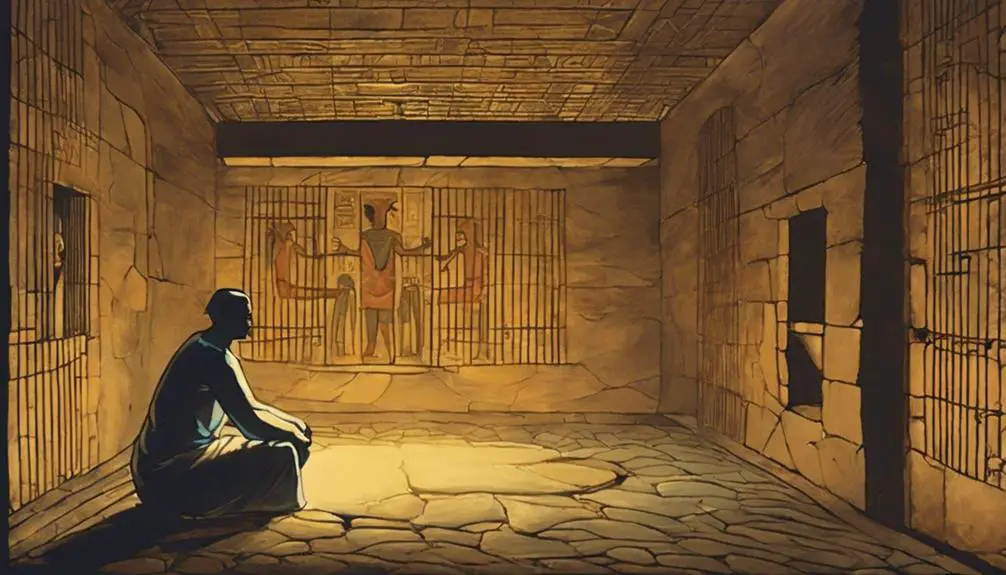
After being falsely accused by Potipar's wife, Joseph's steadfast adherence to righteousness lands him in prison, where he discovers his unique ability to interpret dreams. It's in this harsh environment that his gift surfaces, and he becomes renowned for his uncanny knack for unraveling dream symbolism.
His interpretations aren't arbitrary or whimsical but rather reveal profound Biblical parallels. When fellow inmates, a baker and a cupbearer, share their dreams with Joseph, he interprets them with accuracy. The cupbearer's dream, symbolizing his restoration to his former position, comes to fruition. Unfortunately, the baker's dream, symbolizing his impending death, also becomes reality.
Joseph's ability to interpret dreams with such precision underlines his spiritual sensitivity and discernment. But it's more than that. It's a testament to his faith and perseverance under the trials he endures. Despite his unjust imprisonment, he doesn't falter or lose hope but instead uses his gift to provide comfort and insight to others.
Rise to Power in Egypt
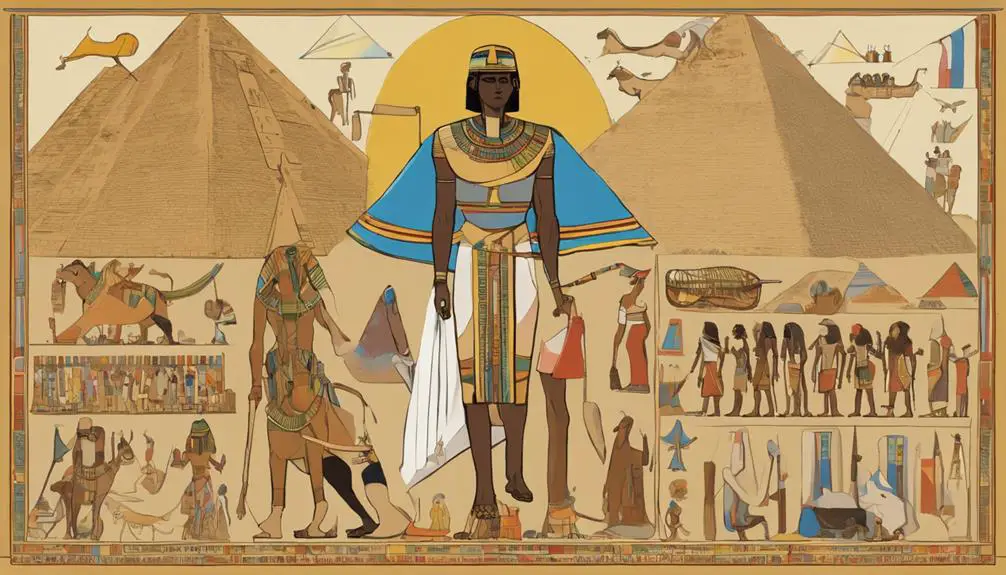
Remarkably, it's during his unjust imprisonment that Joseph's life takes a dramatic turn, catapulting him from the depths of an Egyptian dungeon to the pinnacle of Pharaoh's court. It's here that the narrative shifts dramatically, the curtain of obscurity lifts, and we see Joseph's ascension to power in the Egyptian Administration.
This unprecedented rise is primarily due to Pharaoh's Favor. Intrigued by Joseph's ability to interpret dreams, the Pharaoh sees in Joseph not just an interpreter, but a wise and discerning administrator. Consequently, Joseph's elevation is swift and dramatic.
To illustrate the phases of his rise, consider the following table:
Phase |
Event |
Outcome |
|---|---|---|
Imprisonment |
Interprets Pharaoh's dreams |
Gains Pharaoh's Favor |
Elevation |
Appointed Vizier |
Becomes second in command |
Administration |
Implements seven-year plan |
Saves Egypt from famine |
Consolidation |
Buys up land for Pharaoh |
Strengthens Pharaoh's rule |
Recognition |
Given Egyptian name and wife |
Fully integrated into Egyptian society |
This table depicts Joseph's transformation, reflecting the stages of his rise from prisoner to Pharaoh's right hand. It's a testament to his resilience, wisdom, and God's providential hand shaping the course of history.
Reunion and Reconciliation With Family
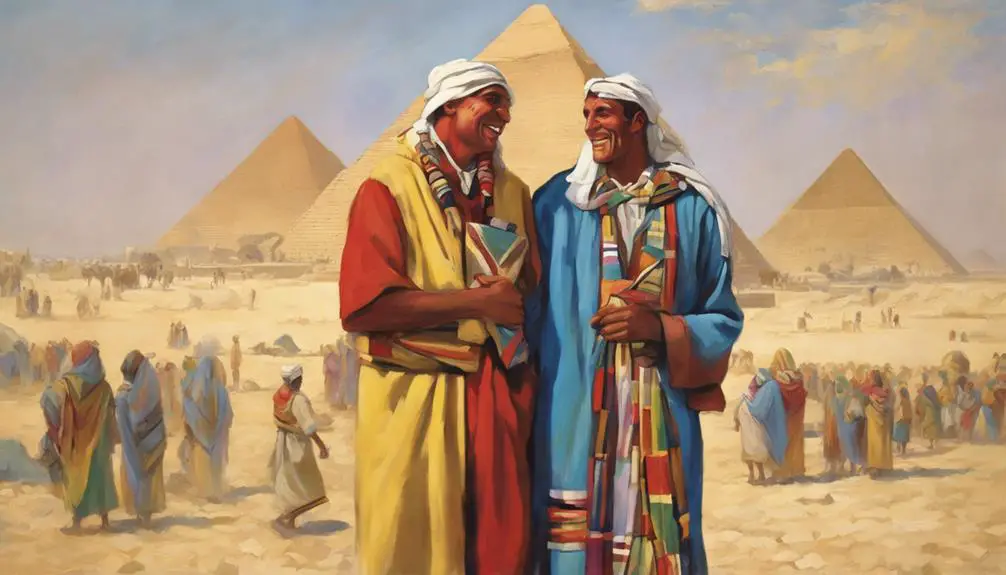
In this next chapter of Joseph's narrative, you'll see a profound shift from political powerplay to familial reconciliation, as circumstances lead him to re-encounter his estranged family, paving the way for a dramatic reunion and subsequent reconciliation.
In the face of severe famine, his brothers travel to Egypt, unknowingly seeking aid from the brother they'd wronged years before. Joseph, now a man of significant influence, is in a position to exact revenge. Yet, he chooses a path of forgiveness, embodying the principle of forgiving transgressions. You'll find this a pivotal moment in the narrative, illustrating the power of mercy and the transformation of Joseph's character.
The reunion isn't immediate. Joseph first puts his brothers through tests of character, ultimately revealing his identity in a poignant scene filled with mixed emotions. This reunion reaffirms the importance of family bonds, even in the face of past wrongdoings.
Joseph's reconciliation with his family is marked by forgiveness and compassion, which lead to the survival and prosperity of his family. In this episode, you're shown the enduring significance of family ties and the transformative power of forgiveness in the biblical narrative.
Frequently Asked Questions
What Is the Historical and Cultural Context Surrounding Joseph's Life in the Bible?
You're exploring the historical and cultural context of Joseph's life in the Bible, without referencing specific timeline events.
Joseph's leadership played a pivotal role in his story, demonstrating his resilience and wisdom. His ability for dream interpretation, a valued skill in ancient cultures, elevated his position.
Understanding this context deepens your grasp of his character's significance and the cultural values of the time.
Are There Any Archaeological Evidences Supporting the Biblical Account of Joseph?
Yes, there's archaeology supporting Joseph's biblical account but it's indirect. Joseph's dream interpretations are reflected in ancient Egyptian texts, showing similarities in dream symbolism. His patriarchal role also finds parallels in Egyptian records of Semitic people rising to power.
However, there's no direct archaeological evidence like inscriptions mentioning Joseph. Remember, lack of direct evidence doesn't disprove the narrative, considering the antiquity and nature of biblical accounts.
Are There Other Religious Texts That Mention the Story of Joseph?
Yes, other religious texts do mention Joseph's story. You'll find references in the Qur'an, where Joseph's dream interpretations are discussed in detail. It emphasizes Joseph's sibling relationships, particularly his brothers' jealousy and subsequent actions.
Additionally, Jewish texts including the Talmud and Midrash further delve into Joseph's life and his profound ability to interpret dreams. These texts provide different perspectives and additional depth to the biblical account of Joseph.
How Has the Story of Joseph Influenced Art, Literature, and Culture Throughout History?
You've likely seen Joseph's influence in various forms of art, literature, and culture. His dream interpretations are often used symbolically in literature, while his character traits of perseverance and faithfulness are depicted in various art forms.
His story has also shaped many cultural norms and values, particularly in Christian societies, emphasizing the importance of forgiveness and divine providence.
What Are the Differing Interpretations of Joseph's Story Among Various Christian Denominations?
You're exploring the varied interpretations of Joseph's story among Christian denominations.
While all recognize Joseph's dreams and sibling rivalry, some view these as God's divine plan, others see lessons about forgiveness and perseverance.
Catholic interpretations often focus on his virtuous character, while Protestant readings might emphasize his faith in God's promises.
Eastern Orthodox churches might underscore his foreshadowing of Christ's passion.
Each interpretation adds richness to the biblical narrative.
Conclusion
In conclusion, you've followed Joseph's journey from beloved son to slave, prisoner, and finally, Egyptian ruler. His life was no smooth ride, yet his faith never wavered.
His ability to interpret dreams elevated him to a position of power, and his wisdom ensured Egypt's survival during famine. Remarkably, Joseph reconciled with his brothers, showcasing his forgiveness and mercy.
His story is a testament to resilience, faith, and redemption, leaving a lasting impact on biblical history.



Sign up